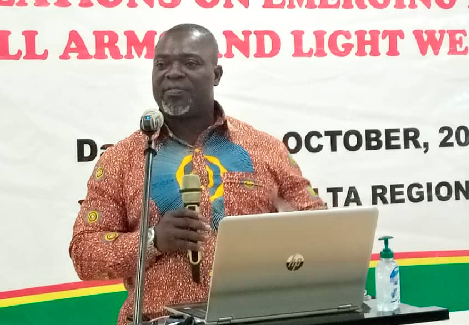State-owned beverage manufacturer GIHOC Distilleries is on the brink of a significant shakeup as its new leadership confronts what it describes as “deep-rooted inefficiencies” severely impacting productivity and financial viability.
The Acting Chief Executive Officer, Jones Borteye Applerh, has strongly hinted at imminent rationalisation amidst low output.
Speaking to the press, Mr. Applerh laid bare the stark reality of GIHOC’s operational decline: “In 2020, we had a staff strength of about 270, and we were producing about 625,000 cartons a year. In 2024, we had a staff of 520 and our production reduced to 275,000 cartons, so it means when it comes to efficiency to boost our revenue, there’s a lot to be done.”
This alarming contrast — a near doubling of staff coinciding with a more than 50% drop in production — paints a grim picture of the company’s efficiency crisis.
The CEO minced no words about the necessary corrective action: “Certainly we will have to rationalise and make sure that our costs are within the levels that we can contain.”
Mr. Applerh has inherited a staggering GH¢427 million in legacy debt, a colossal burden that has crippled the company’s financial stability.
He emphasised that turning GIHOC around and returning it to profitability will necessitate a multi-pronged approach.
This includes not only crucial equipment upgrades and a comprehensive debt restructuring plan, but also, critically, a workforce size that is commensurate with the company’s actual output needs and operational capacity.
The situation at GIHOC is emblematic of challenges faced by several State-Owned Enterprises (SOEs) in Ghana. Many SOEs have historically struggled with issues such as overstaffing, political interference in management and hiring, outdated machinery, and accumulating substantial debts, often requiring government bailouts funded by taxpayers.
In 2023, SOEs collectively recorded a net loss of GH₵1.5 billion, despite significant government investments, underscoring the urgent need for reforms and rationalisation in this sector.
The Public Enterprises Commission (PEC) has been tasked with overseeing the performance of SOEs and ensuring their efficiency.
While staff rationalisation could be a necessary step for financial recovery, it carries significant social implications.
Redundancies at large state entities can lead to widespread job losses, impacting livelihoods and potentially increasing social welfare burdens.
The announcement from GIHOC Distilleries comes at a time when the government, under the 2025 Mid-Year Budget Review, is pushing for fiscal consolidation and increased efficiency across all sectors, including SOEs.
The “Resetting The Economy For The Ghana We Want” agenda, highlighted by Finance Minister Dr. Cassiel Ato Forson, aims to streamline public expenditures and improve the performance of state-owned entities to reduce their burden on the national budget.
The coming weeks and months will reveal the specific details of GIHOC’s rationalisation plan and modalities.
The challenge for the new GIHOC leadership will be to implement these tough measures while ensuring fairness and minimising social disruption, all while steering the venerable distillery back to its former glory.
DISCLAIMER: The Views, Comments, Opinions, Contributions and Statements made by Readers and Contributors on this platform do not necessarily represent the views or policy of Multimedia Group Limited.
DISCLAIMER: The Views, Comments, Opinions, Contributions and Statements made by Readers and Contributors on this platform do not necessarily represent the views or policy of Multimedia Group Limited.


